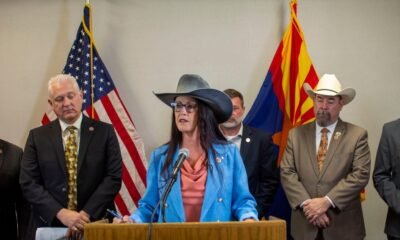AHCCCS
Cuts to AHCCCS Endanger Arizona’s Health, Economy, and Families in Need

In Arizona, the Medicaid program, known as AHCCCS, serves as a crucial support system for approximately 2 million residents, including one in three children.
However, recent congressional proposals threaten to undermine this essential program. Proposed funding cuts could severely impact access to vital health services for Arizona’s vulnerable populations and destabilize the overall healthcare landscape.
Data highlights the stakes involved: last year, AHCCCS provided care to nearly 64,000 individuals battling cancer and more than 450,000 with heart diseases. Additionally, approximately 700,000 residents cope with respiratory issues, while 660,000 face mental health challenges. These are not just figures; they represent individuals who rely on healthcare providers like Denova Collaborative Health on a daily basis.
At Denova, Arizona’s largest outpatient behavioral health organization, we see firsthand the importance of AHCCCS funding. This financial support enables timely care and preventive services for chronic illnesses.
Should funding be reduced, the consequences could extend far beyond fewer doctor visits. Increased emergency room visits and higher insurance premiums are likely outcomes, compounded by the escalation of untreated chronic and mental health conditions.
Cuts to Medicaid funding would also create a ripple effect throughout Arizona’s healthcare system. Reduced revenue may force providers to limit services or shut down facilities, which could lead to a crisis affecting all residents, not just Medicaid recipients. Rural hospitals, already stretched thin, would face dire consequences, risking essential health services in many communities.
Moreover, Arizona struggles with significant mental health challenges, making Medicaid imperative for our response. Denova prioritizes swift access to mental health services, often providing same-day or next-day appointments. This timely intervention is vital for those struggling with various mental health issues.
Beyond healthcare, AHCCCS plays a significant role in Arizona’s economy. The healthcare sector employs over 400,000 individuals statewide. A decline in Medicaid funding could result in job losses, reducing overall economic stability and competitiveness. Proposed cuts may jeopardize Medicaid expansion and threaten an estimated 300,000 jobs, with a potential loss of $30.9 billion in economic activity.
At Denova, we view healthcare as a fundamental right. Our experiences have proven that AHCCCS is essential for fulfilling this commitment. The current congressional debate over funding is not just a policy issue; it directly affects the future health and economic stability of our state.
We call on Arizona’s Congressional delegation to firmly support Medicaid funding. Protecting healthcare access is vital for all Arizonans, ensuring a healthier future for generations to come.
Graham B. Johnson, MAcc, CPA, is the CEO of Denova Collaborative Health, Arizona’s largest provider of outpatient behavioral health services, offering prompt appointments for psychiatry, therapy, and primary care.


















